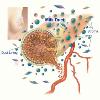

- » Breast cancer campaign slammed for asking women to post boobs online
- » Now, screen breast cancer at home
- » Breast cancer test not as helpful
- » Breast cancer survivors at increased second cancer risk if they smoke
- » Lactate's role in development of breast cancer
- » Chemical exposure before mid-30s 'ups breast cancer risk'
- » Study: Breast cancer survivors can safely become Moms, no proof pregnancy linked to relapse
- » Experts: Up to a third of breast cancer cases can be avoided by eating less, exercising more
- » Acupuncture could relieve joint pain linked to breast cancer treatments
- » Master gene allows breast cancer growth, invasion
Topics: Health Tags: Breast Cancer View |
Topics: Health Tags: Breast Cancer View |
Topics: Health Tags: Breast Cancer View |
|||||||||
Topics: Health Tags: Breast Cancer View |
Topics: Health Tags: Breast Cancer View |
Topics: Health Tags: Breast Cancer View |
|||||||||
Tags: Breast Cancer View |
Topics: Health Tags: Breast Cancer View |
Topics: Health Tags: Breast Cancer View |
|||||||||
Topics: Health Tags: Breast Cancer View |
Topics: Health Tags: Breast Cancer View |
Topics: Health Tags: Breast Cancer View |
|||||||||
Topics: Science and Technology Tags: Breast Cancer View |
Topics: Health Tags: Breast Cancer View |
Topics: Health Tags: Breast Cancer View |
|||||||||
Breast cancer refers to cancers originating from breast tissue, most commonly from the inner lining of milk ducts (duct (anatomy)) or the lobules that supply the ducts with milk. Cancers originating from ducts are known as ductal carcinomas (Mammary ductal carcinoma); those originating from lobules are known as lobular carcinomas. There are many different types of breast cancer, with different stages (spread), aggressiveness, and genetic makeup; survival varies greatly depending on those factors. Computerized models are available to predict survival. With best treatment and dependent on staging, 10-year disease-free survival varies from 98% to 10%. Treatment includes surgery, drugs (hormonal therapy and chemotherapy), and radiation.
Worldwide, breast cancer comprises 10.4% of all cancer incidence (incidence (epidemiology)) among women, making it the second most common type of non-skin cancer (after lung cancer) and the fifth most common cause of cancer death. In 2004, breast cancer caused 519,000 deaths worldwide (7% of cancer deaths; almost 1% of all deaths). Breast cancer is about 100 times more common in women than in men (male breast cancer), although males tend to have poorer outcomes due to delays in diagnosis.
Some breast cancers require the hormones estrogen and progesterone to grow, and have receptors for those hormones. After surgery those cancers are treated with drugs that interfere with those hormones, usually tamoxifen, and with drugs that shut off the production of estrogen in the ovaries or elsewhere; this may damage the ovaries and end fertility. After surgery, low-risk, hormone-sensitive breast cancers may be treated with hormone therapy and radiation alone. Breast cancers without hormone receptors, or which have spread to the lymph nodes in the armpits, or which express certain genetic characteristics, are higher-risk, and are treated more aggressively. One standard regimen, popular in the U.S., is cyclophosphamide plus doxorubicin (Adriamycin), known as CA (Chemotherapy regimens); these drugs damage DNA in the cancer, but also in fast-growing normal cells where they cause serious side effects. Sometimes a taxane drug, such as docetaxel, is added, and the regime is then known as CAT; taxane attacks the microtubules in cancer cells. An equivalent treatment, popular in Europe, is cyclophosphamide, methotrexate, and fluorouracil (CMF). Monoclonal antibodies, such as trastuzumab (Herceptin), are used for cancer cells that have the HER2 mutation. Radiation is usually added to the surgical bed to control cancer cells that were missed by the surgery, which usually extends survival, although radiation exposure to the heart may cause damage and heart failure in the following years.
Diseasesdb: 1598
Icd10: ICD10C50c50
Icd9: ICD9174-ICD9175,ICD9V10.3
Omim: 114480
Medlineplus: 000913
Emedicinesubj: med
Emedicinetopic: 2808
Emedicine Mult: eMedicine2med3287 eMedicine2radio115 eMedicine2plastic521
Meshid: D001943















